- Home
- Mons Kallentoft
Summertime Death
Summertime Death Read online
Table of Contents
Also by Mons Kallentoft
Title Page
Copyright
Dedication
Prologue
Part One: Love Reborn
Chapter 1
Chapter 2
Chapter 3
Chapter 4
Chapter 5
Chapter 6
Chapter 7
Chapter 8
Chapter 9
Chapter 10
Chapter 11
Chapter 12
Chapter 13
Chapter 14
Chapter 15
Chapter 16
Chapter 17
Chapter 18
Chapter 19
Chapter 20
Chapter 21
Part Two: In the Eyes of Summer Angels
Chapter 22
Chapter 23
Chapter 24
Chapter 25
Chapter 26
Chapter 27
Chapter 28
Chapter 29
Chapter 30
Chapter 31
Chapter 32
Chapter 33
Chapter 34
Chapter 35
Chapter 36
Chapter 37
Chapter 38
Chapter 39
Chapter 40
Chapter 41
Chapter 42
Chapter 43
Chapter 44
Chapter 45
Chapter 46
Part Three: You Need to Come, Before Now Stops
Chapter 47
Chapter 48
Chapter 49
Chapter 50
Chapter 51
Chapter 52
Chapter 53
Chapter 54
Chapter 55
Chapter 56
Chapter 57
Chapter 58
Chapter 59
Chapter 60
Chapter 61
Chapter 62
Chapter 63
Chapter 64
Chapter 65
Chapter 66
Chapter 67
Chapter 68
Chapter 69
Epilogue
Advert for Midwinter Sacrifice
About the Author
Also by Mons Kallentoft
Midwinter Sacrifice
SUMMERTIME DEATH
Mons Kallentoft
Translated from the Swedish by Neil Smith
www.hodder.co.uk
First published in Great Britain in 2012 by Hodder & Stoughton
An Hachette UK company
Originally published in Swedish in 2008 as Sommardöden by Natur och Kultur
Copyright © Hard Boiled Company Limited 2012
English translation © Neil Smith 2012
The right of Mons Kallentoft to be identified as the Author of the Work has been asserted by him in accordance with the Copyright, Designs and Patents Act 1988.
All rights reserved.
No part of this publication may be reproduced, stored in a retrieval system, or transmitted, in any form or by any means without the prior written permission of the publisher, nor be otherwise circulated in any form of binding or cover other than that in which it is published and without a similar condition being imposed on the subsequent purchaser.
All characters in this publication are fictitious and any resemblance to real persons, living or dead is purely coincidental.
A CIP catalogue record for this title is available from the British Library
eBook ISBN 978 1 444 72159 1
Book ISBN 978 1 444 72157 7
Hodder & Stoughton Ltd
338 Euston Road
London NW1 3BH
www.hodder.co.uk
For my mother.
And for Karolina, Karla and Nick.
Prologue
Östergötland, Sunday, 25 July
In the final room
I’m not going to kill you, my summer angel.
I’m only going to let you be reborn.
You’ll become innocent again. All the dirt of history will vanish, time will deceive itself and everything that was good will reign in alone.
Or else I really will kill you, have killed you, so that love can arise again.
I tried not to kill, but that made rebirth impossible: the substance remained, clinging obstinately to material, and everything shameful vibrated within you and me like a hot black worm.
Pupated evil. Shredded time.
I tried in various ways, feeling my way, but I couldn’t get there.
I scrubbed, washed and cleaned.
You, my summer angels. You saw snow-coloured tentacles, tearing spiders’ legs, and rabbits’ claws.
I watched over you, gathered you in and took you.
I’m there now.
He’s sitting on the sofa.
His gut is open and rippling black snakes are sliding out onto the floor.
Can you see him?
Now he can’t hurt anyone any more, so say that you want to, say that you dare to come back. No oak floorboards will ever creak again, no alcohol fumes will ever make the air glow with anxiety.
The world is burning this summer.
The trees are transformed into withered black sculptures, monuments to our failures and our inability to love one another, to understand that we are one another.
We are the same, fire and me. Destroying so that life can arise again.
Someone has captured vipers, thrown them into an open oil-drum, poured on some petrol and set light to it.
The mute creatures crawl as they burn, making vain attempts to escape the pain.
Stop crawling, little girl.
I drove past the burning forest just an hour or so ago. I heard you beating against the inside of the car, ready to come out, come back, pure and free from anyone else’s guilt.
She thought she knew something about me.
So foolish.
But don’t be scared. The person you still need to be.
This is how it is: no one can live in fear, only in trust. Death is the penalty for anyone who deprives another person of the ability to trust.
That sort of trust is a close neighbour of love, which means that it’s a close neighbour of death and the white spiders’ legs. We needed you in spite of what you did, in spite of that. You owned our world. We couldn’t escape even though it was the only thing we wanted, and we went to you sometimes because we had no choice. It has haunted me, this enforced seeking after darkness. I know now that I will never be able to choose anything except wishing myself harm.
But when you are reborn, that curse will be lifted.
So it will all be over soon.
Everything will be clear, pure.
White and light.
You will feel nothing within you, just as we once did.
You are shaking and twisting on the floor.
But don’t be scared.
Only love will be reborn. Innocence.
And then we will cycle together along the bank of the canal, in a summer that lasts for ever.
PART ONE
Love reborn
1
Thursday, 15 July
What’s that rumbling, rolling sound?
Something trying to escape?
It’s the sound of rain coming. Thunder. Finally, a drop of water upon the earth.
But Malin Fors knows better. The heat of this summer is devoid of mercy, has made up its mind to dry all the life out of the ground, and rain will be a long time coming.
Through the noise of the lingering customers, Malin can hear the pub’s air-conditioning unit rumble like thunder, shuddering, protesting at having to work such long, demanding shifts, that there doesn’t seem to be any end to
the overtime this summer. The entire contraption seems on the point of collapse, its joints clattering, saying: ‘Enough, enough, enough. You’ll just have to put up with the heat or slake your thirst with beer. Not even a machine can go on indefinitely.’
Is it time to go home?
She is sitting alone at the bar. Wednesday has turned into Thursday and it is just after half past one. The Pull & Bear stays open all summer and the dozen or so customers occupying the tables have fled the draining heat of the tables outside and taken refuge in the blissful cool indoors.
Bottles on shelves in front of mirrors.
Tequila. Cask-matured. Shall I order a single? A double?
Condensation on glasses of freshly poured beer. The smell of sweat and rancid old spilled alcohol is clearly noticeable in the smoke-free air.
She sees her face in the mirrors around her in the bar, from countless angles as it is reflected and then reflected again in the mirror in front of her and the one behind her, above the green leather sofa.
A thousand reflections, but still one and the same face. Skin slightly tanned, her prominent cheekbones framed by a blonde page-boy cut, shorter than usual because of the summer heat.
Malin had gone down to the pub when the film on television ended. It was something French about a dysfunctional family where one of the sisters ended up killing everyone. Psychological realism, the announcer had said, and that could well be right, even if people’s actions seldom have such clear-cut and obvious explanations in reality as they did in the film.
The flat had felt too empty, and she hadn’t been tired enough to sleep, but awake enough to feel loneliness dripping down the walls in almost the same way she felt the sweat running down her back under her blouse. The increasingly tired wallpaper in the living room, the Ikea clock in the kitchen, whose second-hand had suddenly fallen off one day in May, the blunt knives that could do with being honed back to finger-slicing sharpness, all of Tove’s books in the bookcase, her latest purchases lined up on the third shelf. Titles that would be advanced for anyone, but improbably difficult for a fourteen-year-old.
The Man Without Qualities. Buddenbrooks. The Prince of Tides.
Hello, Tove? Can’t you hear Marian Keyes calling you?
Reading.
Infinitely better than a lot of things a fourteen-year-old could come up with.
Malin takes a gulp of her beer.
Still doesn’t feel tired.
But lonely? Or something else?
Summer lethargy at the police station, no work to tire her out, or by which she could be swallowed up. She had spent all day wishing something would happen.
But nothing had happened.
No bodies had been discovered. No one had been reported missing. No summer rapes. Nothing remarkable at all, apart from the heat and the forest fires that were raging up in the Tjällmo forests, resisting all attempts to put them out, and devouring more and more hectares of prime forest with every passing day.
She thinks about the fire brigade, working flat-out. About all the volunteers. A few police cars there to direct the traffic, but nothing for her or her partner, Zeke Martinsson, to do. When the wind is in the right direction she can smell the smoke from the fires, which seems only fitting seeing as the whole of Linköping is enveloped in a hellish heat, day and night alike, in the hot winds from the south that have parked themselves on top of the southern half of the country, as if they had been screwed down onto the landscape by the prevailing area of high pressure.
The hottest summer in living memory.
Malin takes another mouthful of beer. Its bitterness and coolness ease the residual heat in her body.
Outside the city is sweaty, tinted dull sepia, pale-green and grey. Linköping is empty of people, and only those who have to work or have no money or no place to escape to are left in the city. Most of the university students have gone back to their home towns. The streets are eerily empty even in the middle of the day, businesses stay open only because they have to, seeing as the summer temps have already been taken on. Only one business is booming: Bosse’s Ice Cream, homemade ice cream sold from a hole in the wall on Hospitalsgatan. Day after day there are queues outside Bosse’s; it’s a mystery how everyone gets there without being visible anywhere along the way.
It’s so hot that you can’t move.
Thirty-eight, thirty-nine, forty degrees, and the day before yesterday a new local record was reached, forty-three point two degrees at the weather-station out on the plain at Malmslätt.
Record-breaking heatwave!
Old record smashed.
This summer unlike any other.
There’s a cheerfulness in the tone, an energy in the headlines of the Östgöta Correspondent that isn’t matched by the pace of life in this heat-stricken city.
Muscles protesting, sweat dripping, thoughts muddied, people searching for shade, coolness, the city drowsy, in sympathy with its inhabitants. A dusty, smoky smell in the air, not from the forest fires but from grass that’s slowly burning up without flames.
Not a single drop of rain since Midsummer. The farmers are screaming disaster, and today the Correspondent published an article by its star reporter, Daniel Högfeldt, in which he interviewed a professor at the University Hospital. The professor said that a manual labourer in this sort of heat needs to drink between fifteen and twenty litres of water a day.
Manual labourers?
Are there any of those left in Linköping these days?
There are only academics. Engineers, computer experts and doctors. At least that’s what it feels like sometimes. But they aren’t in the city at the moment.
A gulp of her third beer lets her relax, even though she is really in need of a pick-me-up.
The pub’s customers disappear one by one. And she can feel loneliness swelling inside her.
Tove with her bag in the hallway eight days ago, full of clothes and books, some of the new ones she’d bought. Janne behind her in the stairwell, Janne’s friend Pecka down in the street in his Volvo, ready to take them to Skavsta Airport.
She had lied several days before they left when Janne asked if she could drive them, saying that she had to work and couldn’t take them. She wanted to be short with Janne, to show her disapproval that he was insisting on taking Tove with him all the way to Bali, on the other side of the fucking planet.
Bali.
Janne had won the trip in the public employees’ holiday lottery. First prize for the heroic fireman.
A summer dream for Tove. For Janne. Just father and daughter. Their first real trip together, Tove’s first trip outside Europe.
Malin had been worried that Tove wouldn’t want to go, that she wouldn’t want to be away from Markus, her boyfriend, or because Markus’s parents, Biggan and Hasse, might have plans that involved her.
But Tove had been pleased.
‘Markus will manage,’ she had said.
‘And what about me, how am I going to manage without you?’
‘You, Mum? It’ll be perfect for you. You’ll be able to work as much as you like, without feeling guilty about me.’
Malin had wanted to protest. But all the words she could have said felt lame, or, worse still, untrue. How many times did Tove have to make her own meals, or go and put herself to bed in an empty flat simply because something at the station demanded Malin’s full attention?
Hugging in the hall a week or so ago, bodies embracing.
Then Janne’s firm grip on the handle of the bag.
‘Take care.’
‘You too, Mum.’
‘You know I will.’
‘Bye.’
Three voices saying the same word.
Hesitation.
Then it had started up again, Janne had said silly things and she was upset when the door finally closed on them. The feelings from the divorce twelve years ago were back, the lack of words, the anger, the feeling that no words were good enough and that everything that was said was just wrong.
; Not with each other. Not without each other. This single sodding love. An impossible love.
And she had refused to admit to herself how put out she felt by their holiday, like a very young girl being abandoned by the people who ought to love her most.
‘See you when I pick you up from the airport. But we’ll speak before that,’ she had said to the closed grey door.
She had been left standing alone in the hall. They had been gone five seconds and already she felt an infinite sense of loss, and the thought of the distance between them had been unbearable and she had gone straight down to the pub.
Drinking to get drunk, just like I’m doing now, Malin thinks.
Downing a shot of tequila, just like I’m doing now.
Making a call on my mobile, just like I’m doing now.
Daniel Högfeldt’s clear voice over the phone.
‘So you’re at the Pull?’
‘Are you coming or not?’
‘Calm down, Fors. I’m coming.’
Their two bodies facing each other, Daniel Högfeldt’s hairless chest beneath her hands, slipping moistly under her fingertips. I am marking you, Malin thinks, marking you with my fingerprints and why have you got your eyes closed, look at me, you’re inside me now, so open your eyes, your green eyes, cold as the Atlantic.
Their conversation in the pub just ten minutes before.
‘Do you want a drink?’
‘No, do you?’
‘No.’
‘So what are we waiting for?’
They took their clothes off in the hall. The church tower a black, immovable shape in the kitchen window.
And the sounds.
The ringing of the church bell as it struck two, as Malin helped him out of his worn white T-shirt, the cotton stiff and clean, his skin warm against her breasts, his words: ‘Take it slow, Malin, slow,’ and her whole body was in a hurry, starting to itch and ache and hurt and she whispered: ‘Daniel, it’s never been more urgent than it is now,’ thinking, you think I’ve got you for slow? I’ve got myself, other people for that. You, Daniel, you’re a body, don’t try to smooth-talk me, I don’t fall for that sort of thing. He pushed her into the kitchen, the crippled Ikea clock ticking tick tock and the church grey-black behind them, the tree branches brittle with drought.

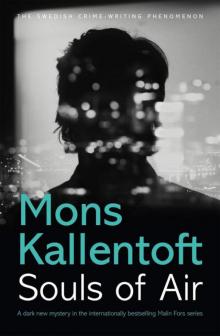 Souls of Air (Malin Fors 7)
Souls of Air (Malin Fors 7)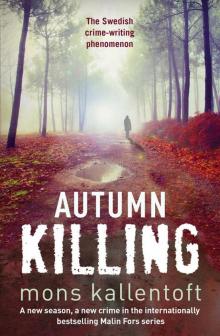 Autumn Killing dimf-3
Autumn Killing dimf-3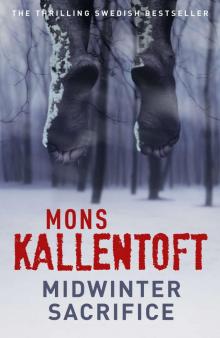 Midwinter Sacrifice
Midwinter Sacrifice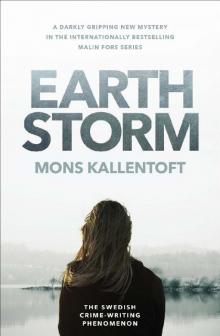 Earth Storm_The new novel from the Swedish crime-writing phenomenon_Malin Fors
Earth Storm_The new novel from the Swedish crime-writing phenomenon_Malin Fors Zack
Zack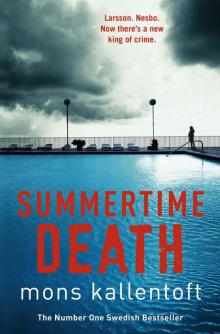 Summertime Death
Summertime Death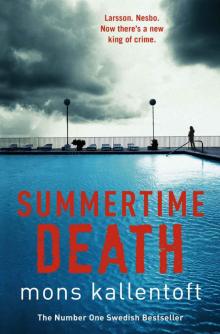 Summertime Death mf-2
Summertime Death mf-2